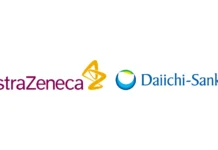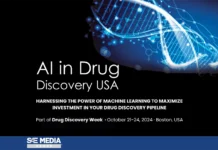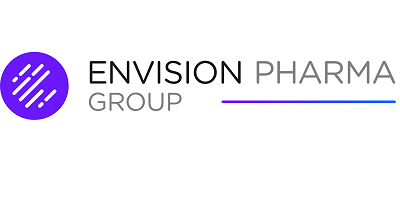In Conversation with Dominic Marasco: AI Beyond Data Crunching for Better Patient Outcomes
In this exclusive interview with World Pharma Today, Dominic Marasco, a leader at Envision Pharma Group, delves into the transformative role of artificial intelligence (AI) in the pharmaceutical industry. While AI is often celebrated for its data-crunching capabilities, Marasco sheds light on how this technology extends far beyond analytics to significantly enhance patient outcomes. From accelerating drug development to personalizing treatment plans, Marasco discusses the multifaceted applications of AI that are reshaping healthcare. Please explore how Envision Pharma Group is leveraging AI to not only advance research but also to improve the quality of care delivered to patients worldwide.
1. Can you elaborate on the importance of merging human intelligence with AI technology in leveraging insights for successful commercialization strategies in the pharmaceutical industry?
Although successful commercialization is achievable without AI, leveraging AI-driven insights can provide a significant competitive advantage by enabling faster, more informed decision-making. AI, with its ability to process vast datasets and uncover patterns, provides us with invaluable insights. However, it’s human expertise that transforms these insights into actionable strategies.
Humans possess the critical thinking skills, medical knowledge, and nuanced understanding of the market landscape necessary to interpret AI-generated findings and develop tailored commercialization plans. AI excels at identifying correlations and trends, but it’s our human judgment that contextualizes these insights, assesses their relevance, and strategizes implementation.
This synergy ensures that AI is not just a tool for data crunching, but a catalyst for informed, strategic decision-making that ultimately drives better patient outcomes and commercial success.
2. How does Envision Pharma Group collaborate with Okra.AI to harness AI technology in developing commercialization strategies? Could you provide some examples of how this collaboration has been beneficial?
Envision has seamlessly integrated OKRA.ai following the acquisition. The benefit of acquiring OKRA.ai rather than forming a partnership means we can integrate Okra’s expertise and powerful AI into our services while strengthening the confidentiality of client data, information, and intellectual property.
Okra’s four “brains,” medical, commercial, access and pricing, and real-world evidence, are focused on enhancing efficiency throughout the commercialization journey. We now leverage these brains to analyze diverse and vast data sources—from clinical trial data to field medical insights—80% faster than traditional methods. This enables us to deliver actionable recommendations to our clients, backed by both data and human expertise.
The benefits of this accelerated insight generation are manifold, analyzing healthcare professionals’ (HCP) engagement patterns, identifying unmet medical needs, and optimizing resource allocation for launches. For instance, AI-powered data analysis was used to examine how Medical Science Liaisons (MSL) in different countries collected and structured their free-text notes. Leveraging AI’s capability to sift through vast amounts of data quickly and identify patterns, the most effective method was identified and implemented as a global standard.
These insights, delivered with unprecedented speed, have empowered our clients to make faster, more informed decisions, resulting in improved market penetration and enhanced patient access.
3. You mentioned the significance of proactive and predictive strategies over purely tactical approaches. How does this proactive and predictive strategy manifest in the integration of AI insights into commercialization efforts?
At Envision, we are pioneering a proactive and predictive approach to integrating AI insights into life sciences commercialization. This strategy goes beyond merely reacting to data and focuses on adopting a purely goal-driven approach. We begin by setting clear objectives for AI implementation, ensuring that technology is strategically selected and applied to achieve desired outcomes, such as improving medication adherence or personalizing treatment.
Proactive and predictive strategies anticipate future trends and challenges, enabling pharmaceutical companies to stay ahead of the curve. By integrating AI insights into commercialization efforts, we can:
- Identify early signals: AI can analyze real-world data to detect emerging market trends, patient preferences, and potential challenges before they become widespread issues. This early detection allows for timely adjustments to commercialization plans.
- Optimize resource allocation: AI-powered predictive models can help identify the most promising channels, markets, and target audiences for promotional efforts. This allows for a more efficient allocation of resources and maximizes the impact of marketing campaigns.
- Personalized engagement: By analyzing customer data and behavior patterns, AI can help tailor communication strategies to individual HCPs and patient groups, improving engagement and driving better outcomes.
- Scenario planning: AI can simulate various scenarios to assess the potential impact of different decisions, helping pharma companies make more informed choices about their commercialization strategies.
By focusing on measurable results and aligning AI with strategic priorities, pharmaceutical companies can ensure that AI is not just a buzzword, but a powerful tool that drives meaningful change and delivers real-world value in medical affairs and commercial landscape.
4. Could you explain how data extraction algorithms are utilized to identify and categorize key drivers and changes in behaviors within the pharmaceutical ecosystem? How does this contribute to driving behavior change and informing commercialization decisions?
Data extraction algorithms are the foundation for AI-powered commercialization insights. These algorithms act as sophisticated sifters, meticulously sorting through vast amounts of structured and unstructured data from a variety of sources. This data can include:
- Clinical trial data can reveal safety and efficacy patterns, uncover potential new indications for drugs, and provide insights into the competitive landscape.
- Real-world data offers a window into treatment patterns, patient journeys, and unmet needs in actual clinical settings.
- MSL notes capture valuable HCP insights, feedback, and areas of particular interest.
- Social media conversations provide a real-time pulse on sentiment and discussions surrounding a particular disease or treatment.
By analyzing this rich tapestry of data, AI can identify key drivers and shifts in behaviors within the pharmaceutical ecosystem. These insights inform strategic decision-making, allowing companies to tailor messaging and engagement strategies that resonate with specific stakeholders and ultimately shape successful market segmentation, product positioning, pricing strategies, and promotional tactics.
5. What are some challenges or considerations that pharmaceutical companies should be aware of when implementing AI technology in their commercialization strategies? How can these challenges be addressed effectively?
Implementing AI in pharmaceutical commercialization presents both transformative opportunities and significant challenges. A key hurdle is establishing trust with stakeholders who may be wary of new technologies. Open communication about AI’s role, data usage, safeguards, and potential benefits is crucial. Transparency is an ongoing process that involves regular monitoring of AI system performance and open dialogue with HCPs and regulatory bodies.
Additionally, there’s the cultural shift. Integrating AI requires a data-driven mindset and a willingness to adapt processes. Companies need to invest in training to ensure their teams can effectively leverage AI insights, and feel comfortable using the platform. AI solutions should be user-friendly and seamlessly integrated with existing systems. Additionally, addressing any knowledge gaps among staff is vital. Comprehensive training programs should focus on data literacy, understanding AI capabilities, and emphasizing the importance of quality data input for accurate insights. By fostering a culture of continuous learning and reinforcement, pharmaceutical companies can empower their workforce to leverage AI effectively.
High-quality data and ethical considerations are also paramount. Robust data management processes and proactive measures to address potential biases are essential. By overcoming these challenges with a strategic and transparent approach, pharmaceutical companies can harness the power of AI to optimize commercialization, streamline operations, and ultimately improve patient care.
6. From your perspective, what are the key success factors for pharmaceutical companies looking to leverage AI technology effectively in their commercialization efforts? Are there any best practices or lessons learned that you can share?
Used as a tool in the right way, AI can transform insights processing to expedite decision-making and time of insight to action. It is at this nexus where the essential blend of the platform, process, and people is essential to the deployment of AI that helps drive performance by delivering impactful and actionable insights at speed.
To successfully integrate AI into medical affairs, a multi-pronged approach is crucial. First, the platform selected must be specifically designed for medical affairs, as not all platforms are created equal when it comes to utility in extracting meaningful insights from medical data.
Pair this with a well-defined process that guides the discovery, delivery, and utilization of these insights throughout the product lifecycle. The process of converting AI insights into action involves several key stages. It begins with an inquisitive mindset — understanding not just what we know but also delving into the questions, themes, and topics we want to explore further. Crafting a focused strategy and flexible operating model allows us to refine our approach and proactively turn insight into meaningful outcomes rather than leaving this to chance.
Finally, technology alone isn’t enough; investing in your people is key. Comprehensive training and change management programs empower teams to embrace and effectively leverage AI.
This harmonious blend of platform, process, and people ultimately drives exceptional medical affairs performance, leading to enhanced decision-making and improved patient outcomes.
7. Finally, could you provide insights into how the partnership between human intellect and AI technology promotes accelerated, intelligent decision-making for successful commercialization? How does this synergy drive value for pharmaceutical companies?
AI can rapidly process and analyze vast amounts of data, and uncover patterns, trends, and correlations that is impossible for humans to discern alone. Yet, it’s the uniquely human trait of curiosity, the drive to question “why,” and the nuanced understanding of the healthcare landscape that breathes life into these insights.
This synergistic relationship between human intellect and AI is the cornerstone of effective decision-making in commercialization. While AI delivers the data-driven foundation, human expertise provides the strategic interpretation, contextual understanding, and critical thinking necessary to translate those insights into actionable plans. This fusion not only accelerates the decision-making process but also enhances its quality, leading to smarter choices that drive faster time-to-market, optimized resource allocation, and ultimately, improved patient outcomes.
This synergy fosters accelerated, intelligent decision-making, leading to:
- Faster time to market: AI expedites processes like data analysis and scenario modeling, shortening development timelines.
- Improved resource allocation: AI helps identify the most promising opportunities, ensuring resources are focused where they’ll have the most impact.
- Enhanced patient engagement: AI-powered personalization creates more meaningful interactions with HCPs and patients, leading to better outcomes.
By embracing this collaborative approach, pharmaceutical companies can tap into a powerful engine for innovation and growth, fueled by the combined strengths of human ingenuity and AI’s computational prowess.
Author: Dominic (Nick) Marasco
 Dominic (Nick) Marasco
Dominic (Nick) Marasco
Envision Pharma Group
Dominic Marasco, Executive President and Chief Commercial Officer at Envision Pharma Group.





















